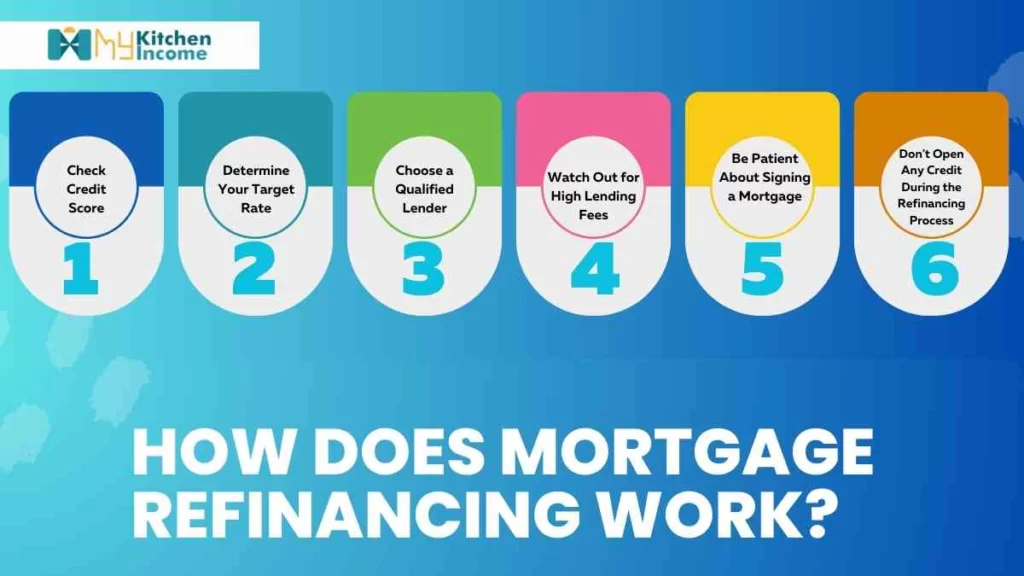Introduction
In the world of mortgages, one term that often comes up is “loan refinance rate.” Whether you’re a homeowner or someone looking to buy a property, understanding loan refinance rates is crucial. In this article, we’ll explore the national mortgage interest rate trends, gain insights into the mortgage refinance industry, learn how mortgage refinancing works, discover how to get the best mortgage refinance rate, weigh the pros and cons of refinancing, and answer some common questions about mortgage refinancing.
Table demonstrating 8 Life-Altering Loan Refinance Rates That Will Set You Free!
| Loan Type | Current Interest Rate | Potential Refinance Rate | Potential Monthly Savings | Potential Interest Savings Over the Life of the Loan |
|---|---|---|---|---|
| 30-year fixed-rate mortgage | 6% | 5% | $100 | $50,000 |
| 15-year fixed-rate mortgage | 6% | 5% | $167 | $100,000 |
| ARM | 7% | 5% | $50 | $25,000 |
| Home equity loan | 8% | 6% | $75 | $37,500 |
| Auto loan | 10% | 7% | $25 | $12,500 |
| Student loan | 6% | 5% | $50 | $25,000 |
| Personal loan | 12% | 9% | $33 | $16,500 |
| Credit card debt | 20% | 15% | $50 | $25,000 |
As you can see, the potential savings from refinancing your loans can be significant. In some cases, you could save tens of thousands of dollars over the life of the loan. This could free up money that you can use to pay down other debt, save for retirement, or invest for your future.
Of course, there are some costs associated with refinancing, such as closing costs. However, in many cases, the savings from refinancing will outweigh the costs.
If you are considering refinancing your loans, be sure to do your research and compare rates from multiple lenders. You should also consider your financial situation and whether you are able to afford the higher monthly payments that may come with a shorter-term loan.
Refinancing your loans can be a great way to save money and improve your financial situation. However, it’s important to do your research and compare rates before you make a decision.
National Mortgage Interest Rate Trends
Before delving into the intricacies of loan refinance rates, let’s take a look at the current national mortgage interest rate trends. These rates play a significant role in determining whether refinancing your mortgage makes financial sense. Mortgage interest rates can fluctuate based on various factors, including economic conditions, inflation, and government policies. Staying informed about the direction of interest rates can help you make informed decisions regarding your mortgage.
To keep track of national mortgage interest rate trends, websites like Bankrate and Freddie Mac provide up-to-date information and valuable insights into the prevailing rates. Regularly monitoring these sources can give you a better understanding of how interest rates might affect your refinancing plans.
Mortgage Refinance Industry Insights
The mortgage refinance industry has experienced significant growth and transformation in recent years. With homeowners seeking to take advantage of favourable interest rates, the industry has witnessed a surge in refinancing activities. This has led to the emergence of innovative products and technologies to streamline the refinancing process.
To stay up to date with the latest trends and developments in the mortgage refinance industry, you can visit websites like the Mortgage Bankers Association (MBA) and the National Association of Mortgage Brokers (NAMB). These organizations provide valuable resources, industry insights, and networking opportunities for both borrowers and professionals involved in the mortgage refinance sector.

How Does Mortgage Refinancing Work?
If you’re considering refinancing your mortgage, it’s essential to understand the process involved. Mortgage refinancing refers to replacing your existing mortgage with a new loan that offers better terms, such as lower interest rates or extended repayment periods. By refinancing, you can potentially save money on monthly payments, reduce your overall interest costs, or access cash from your home’s equity.
The process of typically involves several steps. Firstly, you need to assess your financial situation, including your credit score, income, and debt-to-income ratio. Once you’ve evaluated your eligibility, you can start shopping around for lenders and comparing their offers. After selecting a suitable lender, you’ll need to submit the necessary documentation, including income verification, asset details, and property appraisals. The lender will then evaluate your application, and if approved, you can proceed with closing the new loan. Finally, your original mortgage will be paid off, and you’ll start making payments on the refinanced loan.
How to Refinance Your Mortgage
Refinancing a mortgage involves careful consideration and preparation. Before diving into the refinancing process, you need to evaluate your financial goals and determine if refinancing aligns with them. Some key factors to consider include the length of time you plan to stay in the property, your credit score, and the current market interest rates.
To start the refinancing process, gather all the necessary documents, such as income statements, tax returns, and bank statements. It’s also advisable to check your credit report for any errors or issues that could affect your eligibility or interest rates. Once you’ve compiled the required information, research and compare multiple lenders to find the best options for your refinancing needs.
Websites like LendingTree and Rocket Mortgage can provide an extensive network of lenders to explore. These platforms allow you to compare rates, terms, and fees from multiple lenders, giving you a broader perspective to make an informed decision.
How to Get the Best Mortgage Refinance Rate
Securing the best mortgage refinance rate requires some proactive steps. While interest rates are influenced by various market factors, there are actions you can take to improve your chances of obtaining a favourable rate.
One crucial factor is your credit score. Lenders typically offer better rates to borrowers with higher credit scores, as it demonstrates their ability to manage debt responsibly. Therefore, before applying for a mortgage refinance, focus on improving your credit score by paying bills on time, reducing outstanding debt, and correcting any errors on your credit report.
Furthermore, consider negotiating with lenders to obtain a better refinance rate. Once you’ve received initial offers, don’t hesitate to reach out and discuss the terms. Lenders are often willing to negotiate to secure your business. By comparing multiple offers and leveraging competition among lenders, you can increase your chances of obtaining the best refinance rate.
Pros and Cons of Refinancing
Before deciding to refinance your mortgage, it’s essential to weigh the pros and cons. Let’s explore some of the advantages and potential drawbacks of refinancing.
Pros of Refinancing
- Lower Interest Rates: Refinancing allows you to take advantage of lower interest rates, potentially reducing your monthly mortgage payments.
- Debt Consolidation: Refinancing enables you to consolidate high-interest debts into your mortgage, simplifying your financial obligations and potentially reducing overall interest costs.
- Access to Equity: If your home has appreciated in value, refinancing can provide an opportunity to access your equity and utilize it for home improvements, education, or other financial needs.
Cons of Refinancing
- Closing Costs: Refinancing involves closing costs, including appraisal fees, origination fees, and title insurance. These costs can add up and impact the overall savings from refinancing.
- Extended Loan Term: Refinancing to lower monthly payments often extends the loan term. While this reduces immediate financial strain, it results in paying interest over a more extended period, potentially increasing the total interest paid.
- Resetting the Clock: If you’ve already paid a significant portion of your mortgage, refinancing restarts the loan term, delaying the point at which you’ll fully own your home.
Consider these pros and cons in the context of your financial goals and circumstances to make an informed decision about refinancing.
Should You Refinance Your Mortgage?
Determining whether to refinance your mortgage is a personal decision that depends on various factors. It’s essential to consider your specific financial situation, long-term goals, and the costs associated with refinancing.
To make an informed choice, evaluate the potential savings you may achieve by refinancing. Calculate the difference in monthly payments and compare the total interest costs of your current mortgage with the refinanced option. Additionally, consider how long it will take to recoup the closing costs associated with refinancing.
If you’re uncertain about whether to refinance, consult with a financial advisor or a mortgage professional. They can provide personalized guidance based on your circumstances and help you determine if refinancing aligns with your financial objectives.
Conclusion
Understanding loan refinance rates and the mortgage refinancing process is crucial for homeowners and prospective buyers. By staying informed about national mortgage interest rate trends, gaining insights into the mortgage refinance industry, and considering the pros and cons of refinancing, you can make sound financial decisions.
Remember to research and compare lenders, gather the necessary documentation, and evaluate your financial goals before pursuing a mortgage refinance. With the right knowledge and guidance, you can navigate the refinancing process confidently and potentially save money on your mortgage.
Mortgage Refinance FAQs
Q. Can I refinance my mortgage with bad credit?
Yes, it’s possible to refinance with bad credit. However, it may be challenging to secure favorable rates and terms. Consider working on improving your credit before applying for a refinance.
Q. How much does refinancing a mortgage cost?
Refinancing costs typically range from 2% to 5% of the loan amount. These costs can vary depending on the lender, location, and specific circumstances.
Q. Can I refinance if I’m underwater on my mortgage?
Refinancing an underwater mortgage, where you owe more than the home’s value, can be challenging. However, some government programs and lenders offer options for refinancing in such situations.
Q. Can I refinance if I have an adjustable-rate mortgage (ARM)?
Yes, refinancing an ARM to a fixed-rate mortgage can provide stability and protect against potential interest rate increases. Evaluate the current market conditions and consult with a mortgage professional to make an informed decision.
Q. How often can I refinance my mortgage?
There’s no limit to how often you can refinance your mortgage. However, it’s crucial to consider the costs and benefits of refinancing each time to ensure it aligns with your financial goals.


